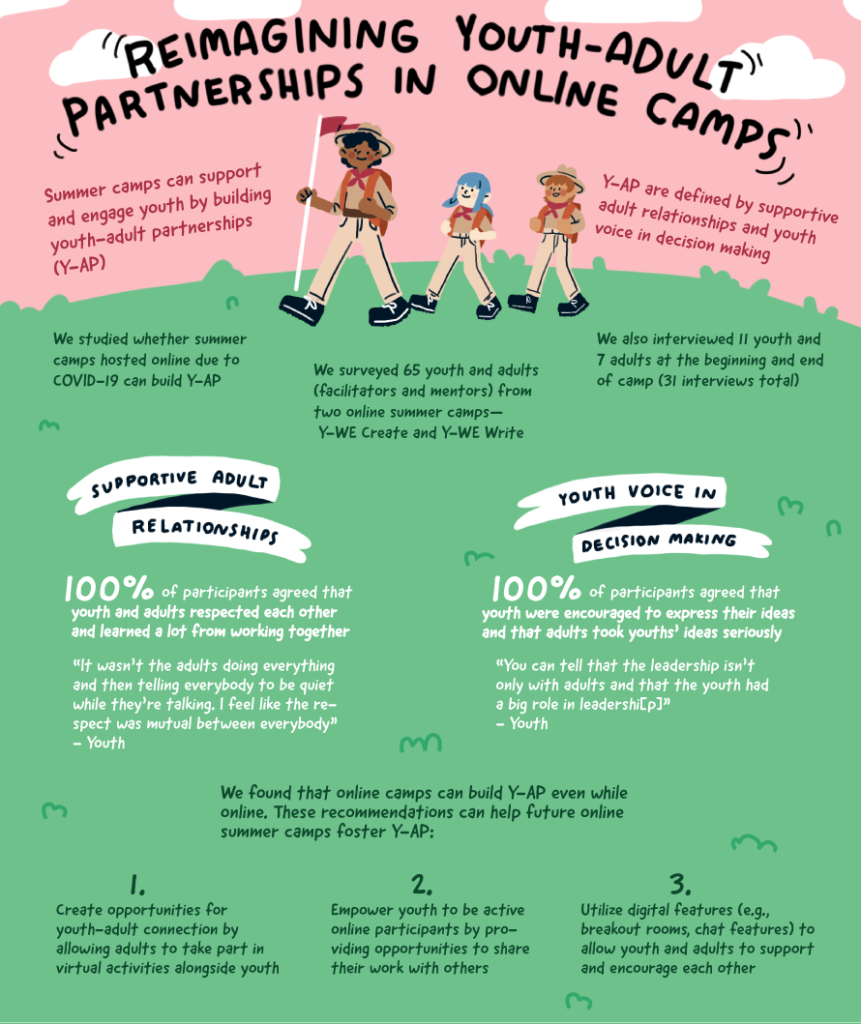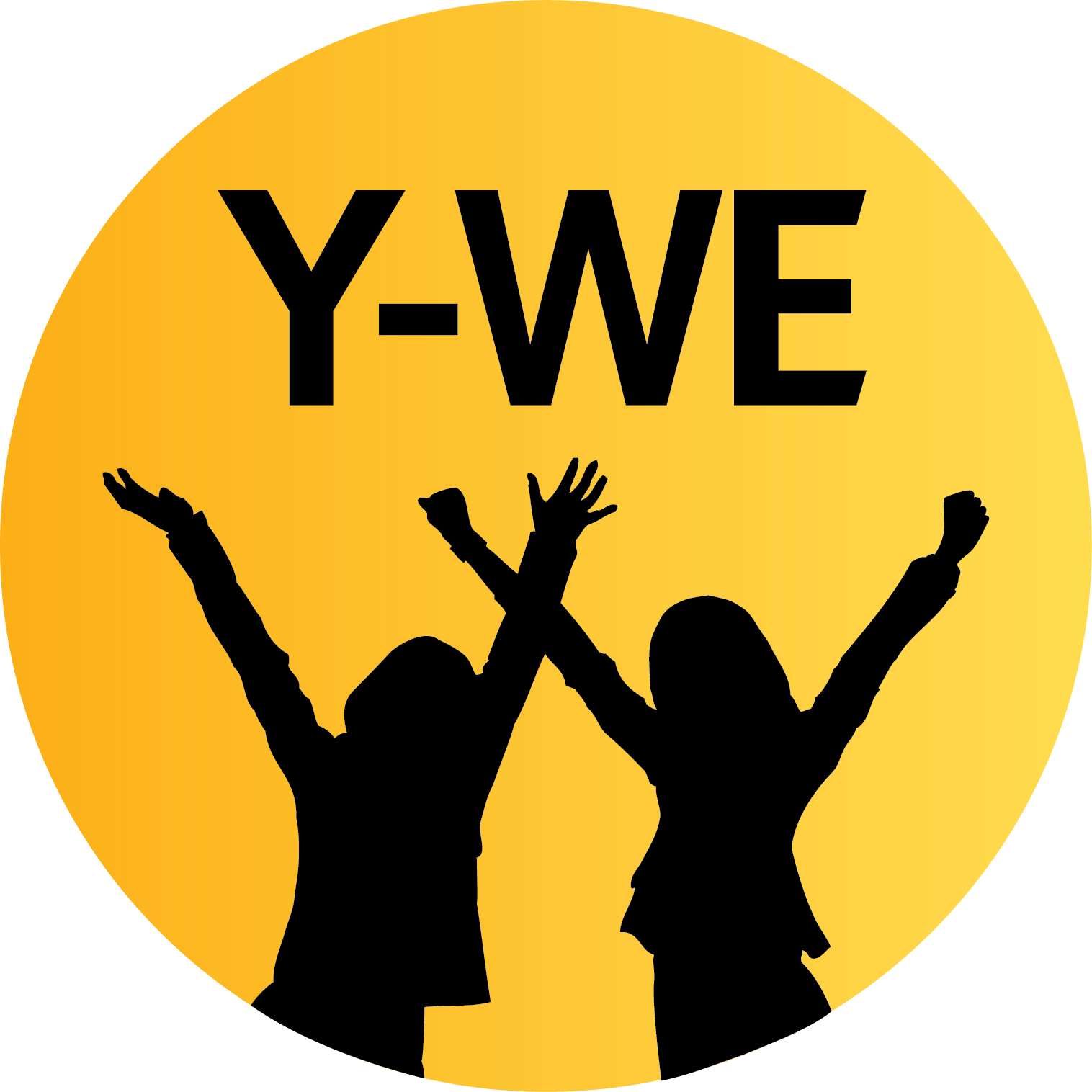By Sydney Parker, foundry10 and Emma Miller, Y-WE
For the past six years, Young Women Empowered (Y-WE) has partnered with researchers at foundry10 to explore the impact of Y-WE programs. As an education research organization, foundry10 uses a wide variety of quantitative and qualitative research methods to learn how Y-WE programs make such a transformative impact on the diverse young women* they serve.
Y-WE and foundry10 have collaborated on research studies to explore many interest areas including youth perspectives on design-centric careers, how to measure individual empowerment, and the role of mentors in reshaping personal narratives. The research questions that we investigate together change as our partnership and shared goals evolve.
“Our partnership with Y-WE is just that, a true partnership. We have worked together over the last five years to build upon the initial respect we had for each other’s work and have built a really collaborative, generative relationship,” said Anna Cechony, Director of Team Strategy at foundry10.
For Y-WE, collaborating with foundry10 “has been a revolutionary experience. To have a program partner with the research innovation, creative resources, and skillful staff to develop measurement tools that reflect the data our community most values has been truly a dream come true. The social networking datasets and graphs have allowed us to capture the core of our mission visually: we are developing communities of belonging. Until this wonderful partnership it felt difficult to ‘prove’ our most transformative impact,” said Rose Waterstone, Co-Executive Director of Young Women Empowered.
To celebrate six years of our unique and meaningful partnership, we’re sharing highlights of the Y-WE and foundry10 research collaboration below. Read on to learn more about how we know and show that Y-WE works.
“Here I Can Just Be Myself”
The aim of “Here I Can Just Be Myself,” a foundry10 study published in the Journal of Community Psychology, was to explore the ways in which a diverse group of youth and adults collaboratively built an identity‐safe community at Y-WE Create, a residential creative design program that predominantly serves girls of color.

A substantial body of research suggests that adolescent girls, youth of color, and LGBTQIA+ youth often experience threats to their self‐worth and confidence due to the social invalidation of their gender, race, and sexual orientation status. These experiences are compounded for adolescent girls with multiple marginalized identities due to interlocking structures of inequity.
An identity-safe community is a social context where all participants are valued, included, and can engage without fear of stigmatization. Identity‐safe environments can promote connection for underrepresented youth and adults in the face of the isolation that arises from constant exposure to alienating sociocultural stereotypes.
In this research study, we explored the ways in which youth and adults collaboratively developed an identity-safe camp community. We conducted daily interviews with three youth of color and two mentors of color ranging in age from 13-28 (32 interviews in total). Data analysis found that youth and adults at Camp Y-WE Create collaboratively developed identity‐safety in the following ways:
- Practicing authenticity in daily interactions.
- Engaging in programmatic activities that sought to understand youth’s identities.
- Facilitating dynamic communication across intergenerational friendships.
Youth and adults supported each other to establish and sustain a community of belonging, trust, and connection. This served as a strong foundation for youth and adults to engage in positive risk‐taking and self‐reflection.
Taking Risks Towards Connection
At traditional summer camp, camp directors often plan physical risk-taking activities such as sports competitions, challenge course activities, or outdoor education to build community and individual empowerment.
At Y-WE Create 2019, we investigated how activities that integrate physical challenges, but center emotional and creative risk-taking, would impact youth feelings of connection and belonging at camp.
Adult mentors planned and facilitated activities that gradually increased the level of creative and emotional risks youth were invited to take throughout the week, peaking in the middle of camp, and then scaling back down as youth prepared to re-enter their lives outside of the camp setting.

One way that youth took positive risks was through interrogating self-limiting beliefs about themselves. For example, a youth camper challenged negative thoughts she had around her body:
“One of my issues is that when I have a negative thought or something holds me back, I kind of have this other thought that says there’s no use fighting it. It’s going to happen anyway. And I think that’s a really limiting belief for me is it’s not worth it to fight back. I think the strongest one in my life for the last few years has been self‐hatred and body shame, and that’s just been a constant in my life and I’m actually addressing that in a workshop coming up at camp.”
Another way that youth engaged in positive risk-taking was by challenging themselves to conquer a fear, such as performing at the camp talent show. These experiences often helped participants address and revise negative self-perceptions.
“It [playing my clarinet] is scary to think about, because I’m going to be in front of everybody and sometimes I squeak or I get the note wrong…I really, really, really have to rehearse today…I don’t like being in front of people because I can be very awkward and sometimes I might stare a lot…I’m hoping to leave some of my stage fright behind because I’m going to be playing in front of people and that’s a big thing for me. Like a really huge thing.”
In addition to positive risk-taking, youth and adults benefited from a robust culture of social support.
The Impact of Social Support
Social support plays an important role in making youth feel safe and welcome at camp Y-WE Create. In our 2019 research, Supporting Young Women and Gender Expansive Youth in Reshaping Personal Narratives: An Intergenerational Community Mentoring Approach, we define social support as advice, approval, and assistance from youth and adult camp participants that makes others feel cared for and valued as part of the community.
Some youth expressed that peer social support was integral in bolstering their own feelings of acceptance at camp. For example, one youth talked about the reciprocal relationship between receiving social support from a friend and feeling free to express herself at camp:
“I love Joey [camper], they are saying I’m beautiful and I’m awesome. They’re always checking up on me…It’s like at school I have to be a lot quieter because kids can be really mean. But here I can just be myself. I can be my own human. My spirit can just run free here.” – Y-WE Create youth camper, 2020.
Other campers felt deeply supported by adults at camp. Y-WE Create intentionally brings youth and adults together in different kinds of groupings throughout the day to foster greater engagement of the whole community. These groups include:
- Plenary: Facilitators lead the entire group of adults and youth campers in an activity.
- Track time: Youth work with mentors on specific projects like sewing, performing or podcasting.
- Family group: A home base for the youth to check-in with a small group of peers and adults.
- Workshops: Open space for anyone to join in conversation and learning.
Participants described sustaining identity safety through formal social support spaces, mutual support in group settings, and peer support. Our three main takeaways from this work:
- Multiple one-on-one mentoring relationships with adults allowed youth to challenge and reshape personal narratives to be empowering and true to their emotions.
- Reciprocal connections from years of Social Network Analysis reflect that youth and adults are learning from each other and supporting each other.
- Being authentically seen and heard by an adult is impactful for youth learning to value their own voice and experience.
“The intergenerational mentoring model worked to challenge power dynamics in youth-adult partnerships by having mentors participate in activities alongside youth. By capitalizing on differing life perspectives across the age spectrum, youth were able to explore their own values with mentors and build their sense of self-worth,” said Dr. Jennifer Rubin, Senior Researcher, foundry10.
The arrival of the pandemic in 2020 provided a new opportunity to learn about how a community of belonging can be developed in the online space.
Reimagining Youth-Adult Partnerships Online
In 2020, when two Y-WE summer camps were shifted to online for pandemic health and safety, Y-WE reimagined how they could continue fostering strong youth-adult partnerships remotely. Youth-Adult Partnerships (YAP) are characterized by supportive adult relationships and youth voice in decision making.

Remote youth campers had the opportunity to explore various hands-on subjects from home, including clothing upcycling, mural making, farming, and much more. That summer, foundry10 staff members Jennifer Rubin, Anna Cechony, and Kat Chen participated as Y-WE Create camp mentors while conducting research on how youth deepen artistic practice, build community, and share social support within virtual programming.
“I learned some incredible new skills!! I also felt close to the people in my cohorts even though it was a virtual gathering! This meant a lot to me because I’ve been struggling with feeling connected over the internet and Y-WE Create helped me feel much more grounded in community love and support!” — Y-WE Create Online youth camper.
We identified and presented on three practices that can help foster Youth-Adult Partnerships at online camp:
- Encouraging adults to take part in virtual activities alongside youth to allow for connection and shared camp experiences.
- Providing multiple opportunities for youth to share their work, thereby empowering them to be active online participants.
- Utilizing features of online platforms (e.g.,breakout rooms, chat features) to help youth
and adults co-create a culture of support online.
Youth participants ages 12-18 and adults (facilitators and mentors) completed surveys (Create: n = 37; Write: n = 28) designed using adapted Youth Voice in Decision Making and Supportive Adult Relationships subscales and participated in interviews with foundry10 researchers. The survey responses were overwhelmingly positive.
- 100% of survey respondents at Y-WE Create and Y-WE Write agreed that youth and adults learned a lot from working together.
“It wasn’t the adults doing everything and then telling everybody to be quiet while they’re talking. I feel like the respect was mutual between everybody.” – Youth participant at Y-WE camp.
- More than 95% of survey respondents reported that youth were encouraged to express their ideas and opinions and that adults took youths’ ideas seriously in both online camps.
“You can tell that the leadership isn’t only with adults and that the youth had a big role in leadership.” – Youth participant at Y-WE camp.
Celebrating our Partnership
This upcoming summer we are excited to partner with Y-WE to do a deeper dive into how creative risk taking and wellness shows up for young people at camp. In previous years, Y-WE Create has offered abundant opportunities for creative risk —experiential risks such as overcoming a fear, enrolling in a challenging course, or starting a new friendship. This year, we are going to investigate the impact of creative risk taking for participants. In addition, Y-WE programming in the last year has been very focused on youth wellness and centering the holistic needs of youth. We are excited to learn more about what wellness means for youth and its potential positive impact on their well-being.
Working closely with members of the Y-WE community ensures that the research we do is meaningful for foundry10, Y-WE, and the broader community. We look forward to many more years of learning and growing together!
